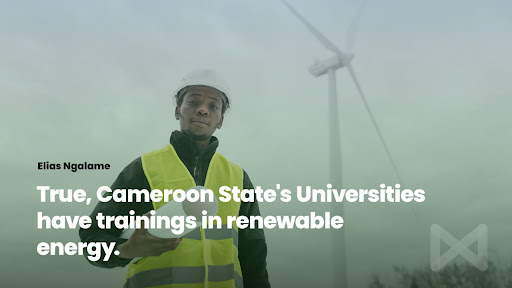Cameroon’s higher education system has embraced training in renewable energy, to combat climate change and fight unemployment. A press release signed by the minister of higher education Jacques Fame Ndongo August 11, 2023 has created the department of renewable energy in all 11 state Universities in the country. Studies in renewable energy begins in the 2023/24 academic year commencing in October, the release states.
According to the minister the move is in line with a decision by higher education officials in the CEMAC zone to ensure the region has the required manpower to meet the growing demand for renewable energy in the different countries in the region. Growing demand for off-grid, decentralized renewable energy solutions in the CEMAC zone is challenged by a shortage of skilled professionals to design, finance, sell, install, operate and maintain systems, higher education officials in the region acknowledged. « This decision is in line with resolutions by CEMAC heads of states to professionalize University education to speed up growth and fight against unemployment. Our Universities are opened to students from all CEMAC countries » Jacque Fame Ndongo Minister of higher education said on State Radio CRTV the day after the decree.
The training of renewable energy professionals at University level academic aims to improve skills development offers for key stakeholders in the decentralized renewable energy ecosystem (e.g. technicians, sales agents, extension officers, credit institutes, teachers) in the Central African region. Being the biggest economy in the region Cameroon’s Universities long open its doors to students from the different countries in the Central African region, a move geared at reinforcing regional integration, he explained.
A 2021 report by the World Bank notes that the lack of adequate human capital was a big challenge to the expected economic growth and integration in the CEMAC region, thus the need to improve on professional training. Faced with these challenges, the CEMAC Heads of State made a firm commitment at the 15th Extraordinary Summit in Yaounde in 2023,to step up efforts to develop human capital. The CEMAC’s Economic and Financial Reform Program (PREF-CEMAC) for the period 2021-2025 thus integrates, for the first time, human capital as a new axis of priority reforms, the report states. « This represents a historic opportunity for CEMAC countries to rewrite the social contract and unleash their growth potential » the report says. Experts say the region is rich in resource potentials in renewable energy, yet lacks energy supply especially in rural areas.
« With the training of skilled professionals at University level, the Sub- continent will reach out to meet the labour market demand as the continent increasing embrace alternative clean energy and reinforces the fight against climate change» says Harison Ajebe Nnoko, CEO of AJEMALEBU SELF HELP (AJESH) an NGO that works with rural communities in Cameroon. The renewable energy sector in the Central African nation lacks human resources to plan, design, install, monitor and maintain energy systems, but demand is growing Ajebe Nnoko notes. “In Cameroon like other countries in the region we are facing persistent blackouts and rising cost in energy supply. The increasing awareness of climate change have pushed the business of renewable and alternative energy use in Cameroon and other countries in the sub-region in the past few years, thus the need to train mor experts in the domain » he explained.
Cameroon faces urgent problems of energy shortages especially rural communities, rural poverty and climate change, which require investment in people and infrastructure development, says Cameroon Minister of the economy planning and regional development, Alamine Ousman Mey, speaking at a loan signing agreement with AFREXIMBANK in February 15, 2023, Minister Alamine said « the loan is to boost phase III of the project to electrify 200 localities through photovoltaic solar system». The FCFA 34.7 billion loan according to the Minister constitutes partial financing of phase III of the Rural Electrification project and falls within the framework of the objective of the Rural Electrification Master Plan adopted in 2016 which aims at connecting 1 million new households to electricity between 2017 and 2035. « The government and development partners have been multiplying efforts to upgrade Cameroon’s electricity coverage especially in the rural areas where there’s great deficit » the Minister said.
Media reports show that electricity coverage in rural areas in Cameroon stands at just 22 per cent electrified. It is against this backdrop that the World Bank approved about FCFA 88 billion last year, 2022 for the electrification of some rural communities in six regions of the country notably, North, Far North, Adamawa, North West, South West and East Regions. « The FCFA 34.7 loan contract is bringing fresh hopes that the electricity situation in Cameroon’s rural milieu will soon improve as works for the electrification of 200 more localities through the Solar System will be partially funded» reports The Guradian Post.
In its National Development Strategy 2020-2030, Cameroon has set significant targets for the development of its electricity sector: at least an additional 3,500 MW by 2035 and about 1 million new connections to achieve universal access to electricity by 2035 according to the African Development Bank AfDB 2022 report. Experts appreciate the project to train and improve skills in renewable energy in Cameroon and the Sub-region in general that offers good opportunities for self employment.
According to Linus Mofor, energy, infrastructure and climate change head at the African Climate Policy Centre,renewable energy can be used for refrigeration, air-conditioning, water heating, drying cocoa and coffee, irrigating crops, water pumping, and supplying electricity to homes, offices and hospitals, among other things, thus providing multiple employment opportunities. He however notes that such training at University level should be extended to all SDGs. « Creating a department of renewable energy in all state Universities may not be as impactful as integrating sustainable development in all University courses » Linus Mofor said in an interview .
By Elias Ngalame



